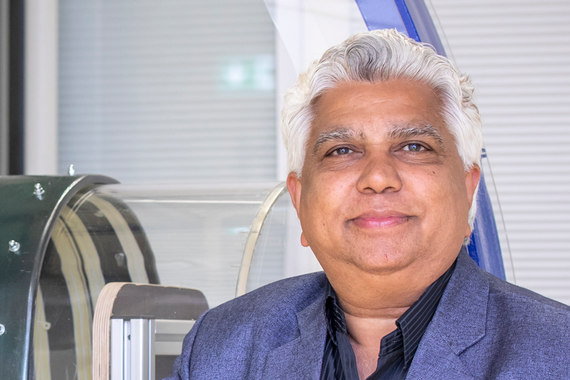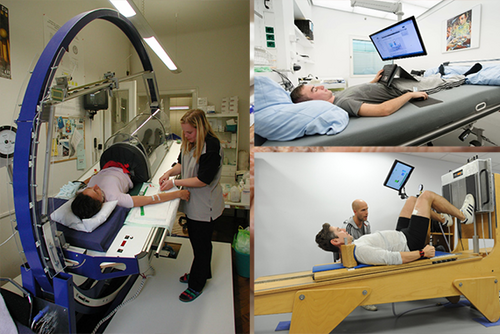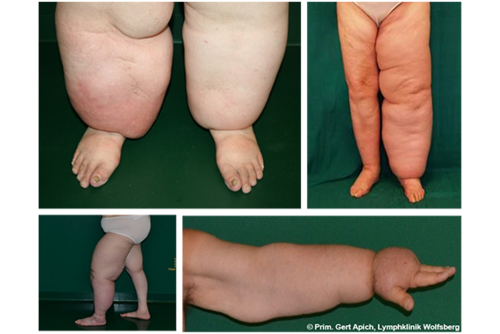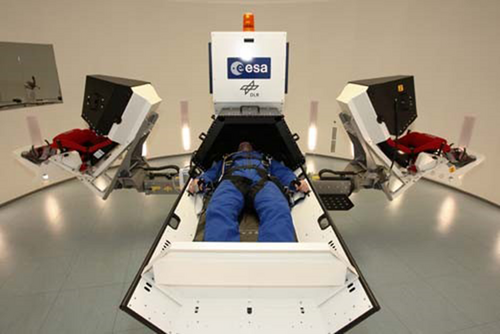- The University
- Studying
-
Research
- Profile
- Infrastructure
- Cooperations
- Services
-
Career
- Med Uni Graz as an Employer
- Educational Opportunities
- Work Environment
- Job openings
-
Health
-
Health Topics
- Health Infrastructure
-
Health Topics
Research team Goswami
Research focus: Circulation and vascular research
PI: Nandu Goswami
Focus: Research interests include the effects of various disorders - on the one hand in healthy humans, such as aging, space travel, prolonged bed rest or exercise, and on the other hand in diseases, such as lymphedema, preeclampsia, HIV, COVID-19, dyslipidemia and diabetes mellitus - on the cardiovascular system. Another area of interest is the vascular system and how it is affected by chronic stimuli. The broad methodological spectrum used here includes noninvasive measurements of endothelial and vascular function as well as blood biomarkers related to endothelial function and blood coagulation in healthy subjects. Our studies are based on data collection in healthy volunteers as well as on patient data and different disease models.
Network: We collaborate closely with various partners within Med Uni Graz. These include research teams from the Division of Physiological Chemistry (Gerhard Cvirn: Coagulation; Karl Öttl: Plasma Proteins), the Division of Pharmacology (Gunter Marsche: Lipid Oxidation), the Diagnostic & Research Institute for Hygiene, Microbiology and Environmental Medicine (Harald Kessler: HIV and COVID-19), the Department of Internal Medicine (Harald Sourij: Diabetology; Regina Roller-Wirnsberger: Geriatrics; Martin Stradner: Rheumatology), the Department of Obstetrics and Gynecology (Mila Cervar-Zivkovic: Preeclampsia), the Department of Medical Psychology and Psychotherapy (Christian Fazekas: Resilience), and the Department of Psychiatry (Sabrina Mörkl: Depression).
Projects
HORIZON EUROPE PROJECT PULSE: 3D Printing of Ultra-fideLity tissues using Space for anti-ageing solutions on Earth
Bioprinting in Space is one of the novel promising and perspective research directions in the rapidly emerging field of bio fabrication. There are several advantages of bioprinting in Space. First, under the conditions of microgravity, it is possible to bioprint constructs employing more fluidic channels and, thus, more biocompatible bio-inks. Second, microgravity conditions enable 3D bioprinting of tissue and organ constructs of more com plex geometries with voids, cavities, and tunnels. Third, a novel scaffold-free, label-free, and nozzle-free technology based on multi-levitation principles can be implemented under the condition of microgravity. The ideal Space bioprinters must be safe, automated, com pact, and user friendly. Thus, there are no doubts that systematic exploration of 3D bioprinting in Space will advance biofabrication and bioprinting technology per se. Vice versa 3D bioprinted tissues could be used to study pathophysiological biological phenomena when exposed to microgravity and cosmic radiation that will be useful on Earth to understand ageing conditioning of tissues, and in space for the crew of deep space manned missions.
In PULSE, we aim at developing a radical new bioprinting technology based on multiple levitation principles and to use Space as an accelerator of ageing on Earth. As a proof of concept study, we will use this newly developed bioprinting technology to create cardiac 3D in vitro models able to better mimic cardiac physiology compared to organoids. We will use such models to study cardiac ageing and test the efficacy of anti-inflammatory/ anti-oxidative drugs with anti-ageing potential.
Team: Goswami, Steuber, Schmid-Zalaudek
SARS-CoV-2 infection in HIV-positive patients with or without antiretroviral therapy in sub-Saharan Africa: Cardiometabolic risk, Thrombosis and Vascular function in sub-Saharan Africa (ENDOCOVID)
- The aim of this novel study is to assess the number of SARS-CoV-2 infections in people living with HIV in two sub-Saharan countries (South Africa and Nigeria). Furthermore, ENDOCOVID aims to estimate the severity of covid-19 disease and to evaluate the effects of covid-19 on vascular function and coagulation during infection and recovery in HIV-positive patients with and without antiretroviral therapy (ART). Cardiometabolic risk, thrombosis risk, and markers of vascular function will be collected.
- Duration: 2020-2022
- Funded by: bmbwf
- Project partners: Per Morten Fredriksen, Kristiania University College, Norway; Knut Lundin, University of Oslo, Norway; Chidozie Agu, Management Sciences for Health, Nigeria; Simiat Olanike Elias, University College of Medicine, Lagos, Nigeria; Dr. Keolebogile Shirley Motaung, Durban University of Technology, South Africa; Benedikta Nkeh-Chungag, Walter Sisulu University, Mthatha, South Africa; Gerhard Cvirn, Division of Physiological Chemistry, Med Uni Graz; Harald Sourij, Clinical Department of Endocrinology and Diabetology, Med Uni Graz; Harald Kessler, Diagnostic and Research Institute for Hygiene, Microbiology and Environmental Medicine, Med Uni Graz; Evelyn Stelzl, Diagnostic and Research Institute for Hygiene, Microbiology and Environmental Medicine, Med Uni Graz;
Health & Academic Performance with Happy Children (HAPHC)
- Over the past decades, there has been a huge increase in inactivity and obesity among children and adolescents. Increased physical activity and a healthy diet can help to curb this development. The aim of this project is to explore how physical activity, actively incorporated into the classroom, affects school children. The experience gained in Norway (HOPP project) and the knowledge that has already been established will be continued and extended to Europe.
- Duration: 2020-2023
- Funded by: Europäische Kommission
- Project partners: Per Morten Fredriksen, Kristiania University College, Norway; Dominique Hansen, Hasselt University, Belgium; Goran Gumze, Alma Mater Europaea, Slovenia; Andrea Seel, Kirchlich Pädagogischen Hochschule der Diözese Graz-Seckau; Hubert Schaupp, Institut für Forschung und Entwicklung, KPH-Graz; Renate Höck, Bischöflichen Gymnasium Graz; Bildungsdirektion für Steiermark;
Projects funded by Land Steiermark: "Young children in the digital world" and "Analysis of stress levels during the Corona crisis using cortisol measurements from hair strands"
- "Young children in the digital world" investigates the influence of the use of interactive, digital media on the health and development of toddlers, how different offers differ in their effect as well as the influence of the duration and type of media use. "Analysis of stress levels during the Corona crisis using cortisol measurements from hair strands" explores how the exposure to COVID-19 affects the stress levels of different population groups, determined by stress hormone measurements from hair strands as well as questionnaires.
- Duration: 2018-2021 und 2020-2021
- Funded by: Zukunftsfonds Steiermark
- Project partners: Lars Eichen, Institute of Education Research and Teacher Education; Sigrid Hackl-Wimmer, Psychology Department, Uni Graz; Catherine Walter-Laager, Institute of Education Research and Teacher Education, Uni Graz; Manuela Paechter, Psychology Department, Uni Graz and Christian Fazekas, Universitätsklinik für Medizinische Psychologie und Psychotherapie, Med Uni Graz
ESA projects (bedrest, dry immersion and artificial gravity)
- Four different ESA-funded projects are investigating how microgravity (bedrest and dry-immersion studies) and hypergravity (artificial gravity (AG)) affect different physiological systems. On the one hand, the effect on venous blood flow, viscosity and inflammatory parameters as well as molecular mechanisms of coagulation are investigated. On the other hand, how hemodynamics and blood flow in different regions are affected by AG exposure (an individual orthostatic threshold is applied) is explored.
- Duration: 2020-2021
- Fundes by: European Space Agency - ESA
- Project partners: David A. Green, King’s College London, UK; Andrew Blaber, Simon Fraser University, Canada; Andrej Bergauer, Clinical Center Maribor, Slovenia; Gerhard Cvirn, Division of Physiological Chemistry, Med Uni Graz; Patrick De Boever, Universty of Antwerp, Belgium; Olivier White, Université de Bourgogne, France; Sergi Vaquer, European Astronaut Centre, Germany; Gilles Clement, NASA, USA & ISU, Strasbourg, France; Edwin Mulder, DLR, Germany; Joern Rittweger, DLR, Germany; Jochen Zange, DLR, Germany; Timo Frett, DRL, Germany; Igor Mekjavic, Josef Stefan Institut, Slovenia; Marie-Pierre Bareille, MEDES, Toulouse, France; Chantal Simon, University of Lyon, France;
The relationship between polymorphisms of candidate genes and primary lymphedema
- Since lymphedema patients show significant (subclinical) measurements of cardiovascular dysfunction - related to microvascular dysfunction - before, during and after decongestive therapy, measurements of endothelial and coagulation parameters will be performed. The project will also investigate the relationship between possible gene polymorphisms and these parameters. The influence of functional polymorphisms of candidate genes on the dynamics of cardiovascular responses (e.g. I/D-ACE polymorphism or polymorphisms of the angiotensinogen gene) will be evaluated.
- Duration: 2020-2021
- Funded by: Österreichische Agentur für internationale Mobilität und Kooperation in Bildung, Wissenschaft und Forschung, OeAD GmbH (ÖAD)
- Project partners: Omar Sery, Masaryk University Brno, Czeck Republich; Christian Ure, Center for Lymphatic Disorders, KABEG, LKH Wolfsberg, Austria; Gert Apich, Physical Medicine and Rehabilitation, KABEG, LKH Wolfsberg, Austria;






